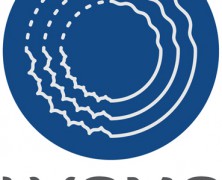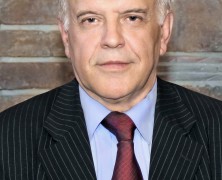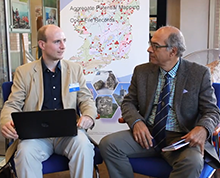What is the basic role of the Latvian Environment, Geology and Meteorology Centre in Latvia? What are the main research areas? State Ltd. “Latvian Environment, Geology and Meteorology Center” (LEGMC) is the largest institution in Latvia engaged in the collection and processing of geological information. However, the main areas of research at LEGMC also include meteorological and hydrological observations and forecasting, air quality monitoring, chemicals and hazardous waste management. For this work LEGMC employs 260 lead qualification specialists. LEGMC Information Analysis Department has several branches: Division of Geology, Division of Inland Waters (hydrology and hydrogeology), Chemicals and Hazardous Waste, and Air and Climate Division. The main activities in the field of geology can be divided into three basic groups: 1) accomplishment of State delegated assignments, 2) commercial side which includes preparation of geological information upon request of other institutions and private sector and 3) participating into national and international projects of different scale. The main tasks of LEGMC in the area of geology are following: Approval of mineral reserves according to the legislation; Preparation of the annual balance of mineral reserves, collection and storage of geological information; Preparation and provision of geological and geospatial information for the needs of the state, society and land users; Investigations of quality of subsoil, geological and geoecological investigations of different hazards to the environment and population; Preparation and evaluation of information regarding mineral deposits occurring in subsoil; Seismic monitoring. Collection and storage of geological information is the main task of LEGMC according to Law on Subsoil. Almost 30,000 thousand reports as well as maps and field books are stored in the State Geological Fund: results of geological mapping, results of geological prospecting, information on mineral deposits and mineral resources, results of geology investigations and engineering, geoecological investigations. This...
Interview with Ms Daiga Pipira, Head of Geology Division at the Latvian Environment, Geology and Meteorology Centre
posted by EuroGeoSurveys
Interview with Mr. Dragoman Rabrenović, Director of the Geological Survey of Serbia
posted by EuroGeoSurveys
The Geological Survey of Serbia (GZS) became a full member of EuroGeoSurveys (EGS) in March 2015. What are the priorities and needs for GZS in order to grow further within EuroGeoSurveys? The Geological Survey of Serbia, which dates back to 1930, has a long and well established history, with internationally recognised professional expertise. Being a full member of EuroGeoSurveys is very important for us. This is in accordance with the strategy of our Survey too. It is an occasion to follow the latest professional trends worldwide, which represents an advantage and a way for every European Geological Survey to increase its international presence. Geology has no borders, and geological practice needs international cooperation. Our priority is to see EGS and GZS in a mutually beneficial ‘win-win’ situation. In order to exchange professional experiences, especially within the new technologies domain, we need well-established cooperation with other Geological Surveys across the EU. Our Survey is going to support our colleagues to join the existing EGS Expert Groups. Serbia is officially a candidate country to become a member of the EU and negotiations with Serbia have already been opened. How would you describe the benefits/consequences of such a milestone for geological survey cooperation? It is clearly important to harmonize EU and RS regulations , and in this instance, those that apply to our profession. EGS provides a focal point for various appropriate professional experiences and this will be another advantage. Our Survey has obligations and plays an active role in creating national regulations relevant to geology. In the landscape of Balkan countries, the Geological Survey of Serbia is quite a large institution and could potentially put cooperation on the right track in several geological domains with neighboring countries. How would you see such a role? For the...
Minerals4EU Project Scientific Staff interviewed by EuroGeoSurveys
posted by EuroGeoSurveys
Minerals4EU Project Scientific Staff interviewed by EuroGeoSurveys at the M4EU progress meeting in Dublin in October 2014. David Ovadia, Project Exploitation Manager Nikolaos Arvanitidis talks about is role as Scientific Officer of the Minerals4eu project, how Minerals4EU will able to provide tools and expertise to mineral resources development in Europe, who will mainly benefits from the project and what will be the expected effects of the project for European...



